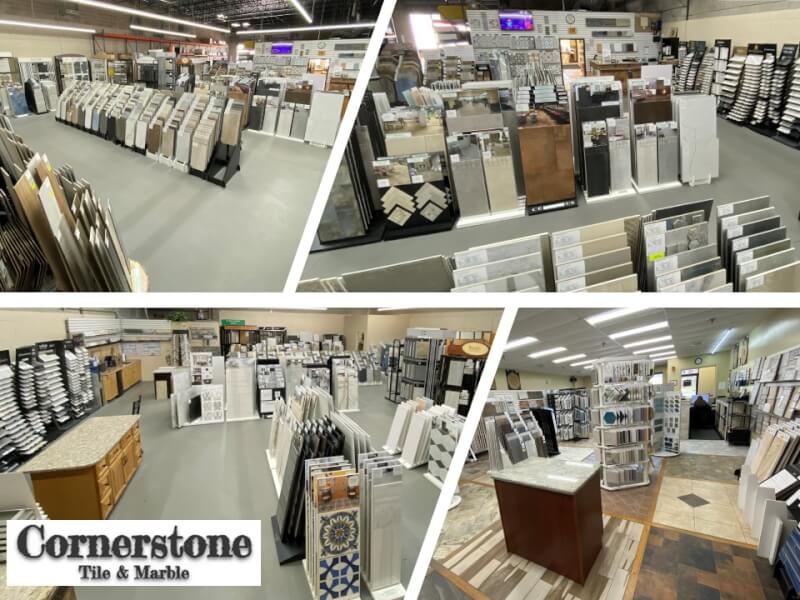Glass Mosaic and Natural Stone Backsplashes: Advantages and Disadvantages
Homeowners have more options than ever when considering a kitchen backsplash. Beyond choosing the perfect color, design, and brand for each project, the final decision is motivated by key factors such as maintenance requirements and cost. While ceramic and porcelain tile are extremely popular for kitchen backsplashes, two other popular options for kitchen backsplashes are glass mosaics and natural stones, the latter including marble, granite, limestone, soapstone, and travertine. We have compiled the key advantages and disadvantages of each to help you make an informed decision that will elevate your kitchen remodel.
Glass Mosaics – The Advantages
Soaring Popularity– You'll be in good company with countless other homeowners if you choose glass mosaics. In considering both the extraordinary beauty and the creativity of glass mosaics, homeowners have been selecting them for kitchens quite often. Plus, not only will you have an incredibly desirable backsplash to enjoy, but you'll be adding to the re-sale value of your home.
Simple Elegance– The reflective qualities of glass tiles gives them a natural grandeur. Much of this can be attributed to glass mosaics being infused with more polish than natural stone for a brilliant sheen. For a kitchen with ample natural light, a glass mosaic backsplash can transform a room and draw the eye in with its mesmerizing palette of colors.
Easy Maintenance – The polished surface of a glass tile allows it to be easily cleaned with traditional, affordable cleaning products. This ease of use makes them quite desirable for homeowners looking for a simple, beautiful solution without any additional hassles. Just keep in mind that small mosaic backsplashes have more joints, so there will be more exposed grout to maintain.
Glass Mosaics – The Disadvantages
Beauty at a Price– Between the craftsmanship and production processes involved, glass mosaics are often more expensive than natural stone. Prices can fluctuate considerably, but the cost per square foot for preferred glass mosaics can range between $18-$45, with high-end options going even higher.
Risky Trendiness – Following the latest trends is ideal for creating a modern space, though there's no telling where style trends will be in the next decade. This isn't a problem for homeowners that are confident that they will enjoy their new kitchen for years to come, but if listing your home in the near future is even a consideration, you may want to explore widely pleasing natural stone, ceramic, or porcelain tile options.
Less Variation– While there are certainly exceptions to this – namely with certain companies that specialize in handcrafted glass mosaics and one-of-a-kind designs – glass mosaics are typically produced in bulk for a uniform look. That's not to say that they are any less beautiful than natural stone, but you won't be getting any of the unique properties that many appreciate natural stone for.
Natural Stone – The Advantages
Timeless Style – Natural stone backsplashes have been hugely appealing for years, and that broad approval isn't expected to change any time soon. Natural stones like marble and granite stand the test of time and are an excellent universal choice that will enhance the value of your home.
Greater Affordability– On average, compared to glass mosaic tile, natural stone can be more affordable, regardless of the style that you're seeking. For larger kitchen projects, the savings can add up.
Unrivaled Uniqueness – As its name implies, natural stone comes from premium natural sources, making each stone wholly original. This exclusivity is one of the main draws of natural stone as homeowners enjoy knowing that the particular combination of colors and textures cannot be found anywhere else on earth.
Natural Stone – The Disadvantages
Cleaning Considerations – The varying properties of natural stone require homeowners to be extra careful when cleaning a natural stone backsplash. Some common household cleaners can detract from the stone's color, and while specialized cleaners or a damp rag are usually acceptable, it's imperative to verify what the manufacturer recommends prior to cleaning. Natural stone is also more textured than glass mosaics, meaning that you'll really have to scrub to clean the deep grooves.
Susceptibility to Damage – A natural stone backsplash is comprised of porous stone, so the liquids that are ever-present in kitchens are a consistent point of concern. Having the stone sealed every few years can help protect it from stains and water damage, though the added maintenance and cost can be prohibitive to some. Natural stone is incredibly alluring and extraordinarily sophisticated but be prepared to exert some effort in keeping it that way.
Style Deviations – The exclusivity that homeowners choose natural stone for can also be one of its major drawbacks since no two stones look exactly alike. This means that when you choose a color and design, the finished product will have slightly different variations than the sample you loved. For those that want a guaranteed, uniform look, mass-produced glass mosaics are a dependable choice.
Considering a glass mosaic or natural backsplash for your kitchen?
Visit our tile and countertop showroom in South Easton, MA for superior selection and service!
